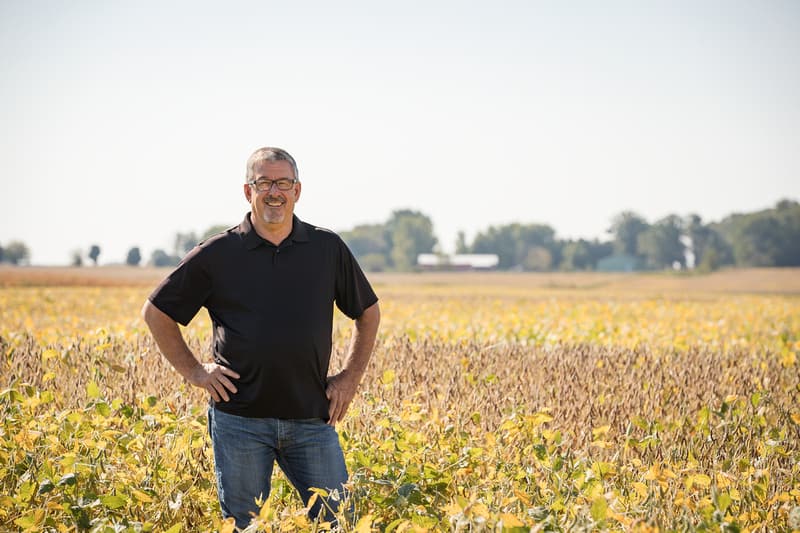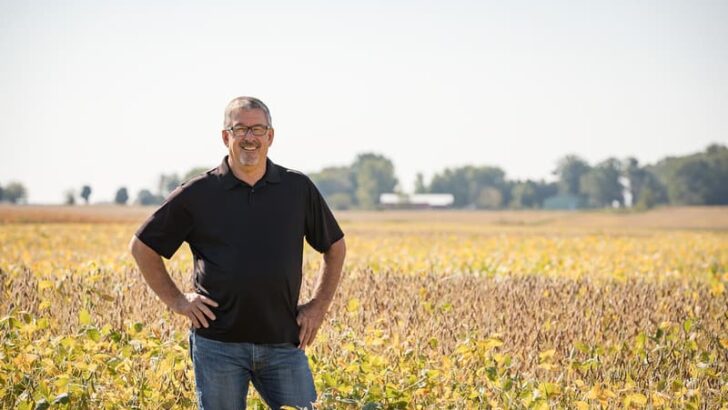This post is sponsored by Illinois Soybean Association checkoff program and Illinois Farm Families
Hey there! We're back again talking about smart water retention practices and the use of rain barrels in urban areas. We also want to state for the record that since talking about this, the rain has returned to Chicago and we're pleased as punch to see our 50-gallon rain barrel filling up! You can order one for yourself as well as a diverter kit if you're ready to get in on the rain action. Also, tune in to our Facebook Page on Saturday morning to see our rain barrel in action and us connecting it to our diverter kit at our house.

Photo Credit: Curt Dennison Photography
Today though, we have a special guest. Farmer, Steve Pitstick from Pitstick Farms is hanging with us virtually to answer some questions about using water in a smarter way for growing food and flowers. Steve is an Illinois Soybean Association (ISA) district director and member of the ISA Production Committee. He produces corn and soybeans near Maple Park, Ill. He holds an associate’s degree from Kishwaukee Community College and has been active previously with the Kane County Farmland Protection Commission, Kaneland Sports Boosters, Kane County Farm Bureau and his church. Pitstick also has participated in the Illinois Ag Leadership Program, Illinois Ag Leadership Foundation, Agriculture Leaders of Tomorrow and served as a Soy Ambassador. He currently also works as an advisor to startup ag-tech companies. You all may remember my foray to a hog farm with Illinois Farm Families some years ago, so he's already A+ in my book.
Enjoy our interview and let us know your thoughts!
Houseful Of Nicholes
How do farmers think about water as it pertains to growing a crop – why is its management so important?
Steve Pitstick
As a farmer in Illinois, I’m fortunate to grow food on some of the most fertile soil in the world. In northern Illinois, we’re very much in a “rain-fed” environment, so our goal is to manage water as best we can to get through both high and low precipitation periods. That’s where different best practices come into play.
Houseful Of Nicholes
What does water management look like on your farm? In times of heavy rain periods or drought, are there any practices/tools you employ to mitigate the impact?
Steve Pitstick
Since my soils are pretty good at absorbing water, most of my focus is on making sure nutrients stay in the field. I use a no-till approach, which means we’re trying not to leave the ground bare. We leave stalks and plant matter from the previous harvest on the ground instead of plowing fields after harvest or before planting. This coverage provides a “blanket” for the field that prevents soil erosion and protects water quality.
Houseful Of Nicholes
Are you able to speak to how some farmers use irrigation and why it’s needed? How is this similar/different than how a community gardener might use a rain barrel for their plants?
Steve Pitstick
In many cases, a farmer will use irrigation if he or she has sandier soil types. Sandy soil doesn’t always retain the level of water needed for a crop thrive, especially during dry seasons. In order for the crop to grow successfully, irrigation helps supplement those water needs by applying specific amounts of water to fields. This water is often pulled from reservoirs that capture and store rainwater for irrigation – very similar to the purpose rain barrels serve for gardens.
Houseful Of Nicholes
Are there other steps you take to manage water flow on your farm?
Steve Pitstick
Water management on the farm is like a sponge. We need to squeeze out the excess water and leave just what’s needed to help our crops grow. As we do that, we want to make sure nutrients stay in the field and aren’t carried away by the excess water. No-till is one way we do that. We also plant buffer strips, a standard practice of planting strips of grass or other vegetation that helps trap valuable nutrients and sediment that otherwise could be carried out of the field by heavy rain.
Houseful Of Nicholes
Are there any tips you can share with garden enthusiasts when it comes to growing healthy crops?
Steve Pitstick
Try implementing a “cover,” like mulch or yard waste, which helps limit water evaporation and controls the growth of weeds or non-garden plants. And, consider purchasing a rain barrel to collect rainwater for you. As I said, Illinoisans are no strangers to rain, so let’s take advantage of it when we can to grow a healthy crop – on the farm or in the city.
Thanks, Steve, for such a great interview and sharing with us on how we can create a better water retention system in both a rural and urban setting. You can follow him on Twitter @PitstickFarms


Ask A Farmer: Smart water retention with Steve Pitstick
Thursday 29th of August 2019
[…] Read about their conversation below and learn more by visiting housefulofnicholes.com. […]